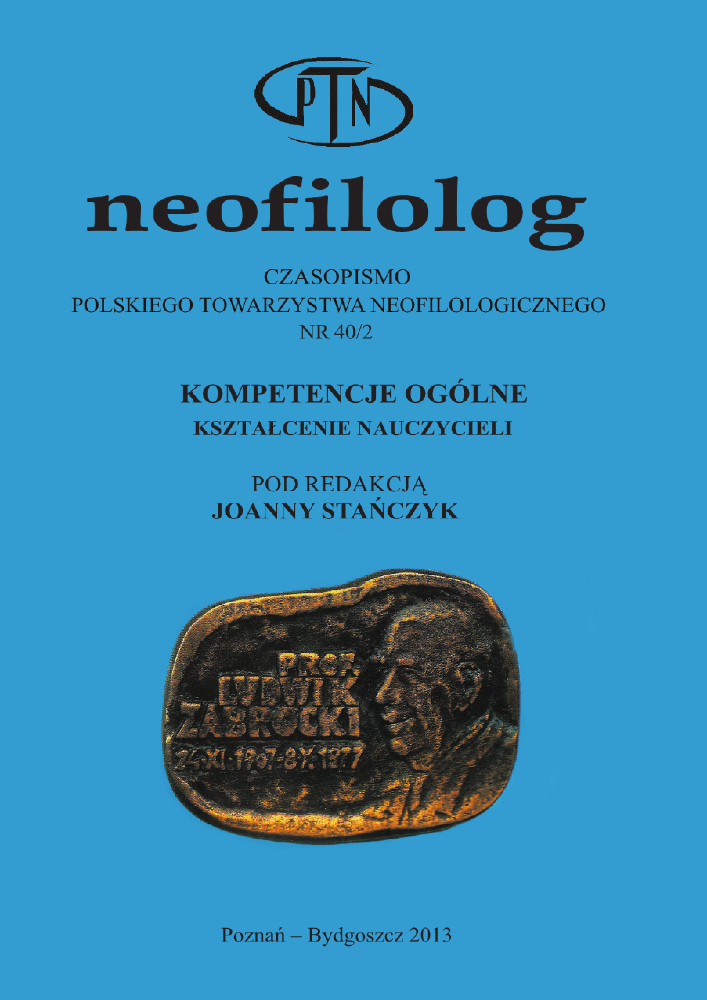Abstrakt
The purpose of the article is to present the motivation and attitude of Polish students towards learning German. The analysis presented is based on research conducted by the author in junior and senior high schools throughout Poland. The findings indicate that the predominant motive for learning German is instrumental. Motivation connected with communication is of less importance in the east of Poland than in the western part of the country. Motivation concerning the culture of German speaking countries does not seem to be relevant for Polish students. There is a strong correlation between increasing and decreasing motivation to learn German and the image of a German person and the attitude towards the German nation: those students who are positively motivated to learn the language present an extremely positive attitude towards German society, while those with lower motivation exhibit strong prejudice against Germans.
Bibliografia
Apelt, W. 1992. «Motive – Motivation – Motivierung». [w:] Jung, U.O.H. (red.). Praktische Handreichungen für Fremdsprachenlehrer. Frankfurt/ Main: Peter Lang. 85-93.
Dörnyei, Z. (2001). Teaching and Researching Motivation. Harlow: Pearson Education.
Gardner, R. C. 2010. Motivation and Second Language Acquisition. The Socio-Educational Model. New York: Peter Lang.
Gardner, R. C. 2012. «Integrative motivation and global language (English) acquisition in Poland». [w:] Studies in Second Language Learning and Teaching 2 (2): 215-226.
Gardner, R. C. i Lambert, W. E. 1972. Attitudes and Motivation in Second-Language Learning. Rowley, MA: Newbury House Publishers.
Mackiewicz, M. 2012. «Alte Stereotype neu definiert? Zum Deutschlandbild der polnischen Jugendlichen». [w:] Krasoń, K.J. i Haedrich, B. (red.). Dialog polsko-niemiecki i niemiecko-polski w języku, literaturze i teatrze/Polnisch-deutscher und deutsch-polnischer Dialog in der Sprache, Literatur und im Theater. Szczecin: PPH Zapol. 171-183.
Netzwerk Deutsch, 2010. Die deutsche Sprache in der Welt. Statistische Erhebungen 2010. Berlin, Bonn, Köln, München: Netzwerk Deutsch.
ORE, 2011. Powszechność nauczania języków obcych w roku szkolnym 2009/2010. Warszawa: Ośrodek Rozwoju Edukacji.
Pawlak, M. 2012. «The dynamic nature of motivation in language learning: A classroom perspective». [w:] Studies in Second Language Learning and Teaching 2 (2): 249-278.
Riemer, C. 2006. «Der Faktor Motivation in der empirischen Fremdsprachenforschung». [w:] Küppers, A. i Quetz, J. (red.). Motivation Revisited. Festschrift für Gert Solmecke. Berlin: Lit Verlag. 35-48.
Licencja
Prawa autorskie (c) 2019 Maciej Mackiewicz

Utwór dostępny jest na licencji Creative Commons Uznanie autorstwa – Bez utworów zależnych 4.0 Międzynarodowe.
Przedstawiany utwór (artykuł) upubliczniany jest na podstawie umowy z autorem i na licencji Creative Commons Attribution-NoDerivatives 4.0 International (CC BY-ND 4.0).
Użytkownicy mają obowiązek podania wraz z rozpowszechnionym utworem, informacji o autorstwie, tytule, źródle (odnośniki do oryginalnego utworu, DOI) oraz samej licencji;
- bez tworzenia utworów zależnych,
- utwór musi być zachowany w oryginalnej postaci.
Uniwersytet im. Adama Mickiewicza w Poznaniu zachowuje prawo do czasopisma jako całości (układ, forma graficzna, tytuł, projekt okładki, logo itp.).
